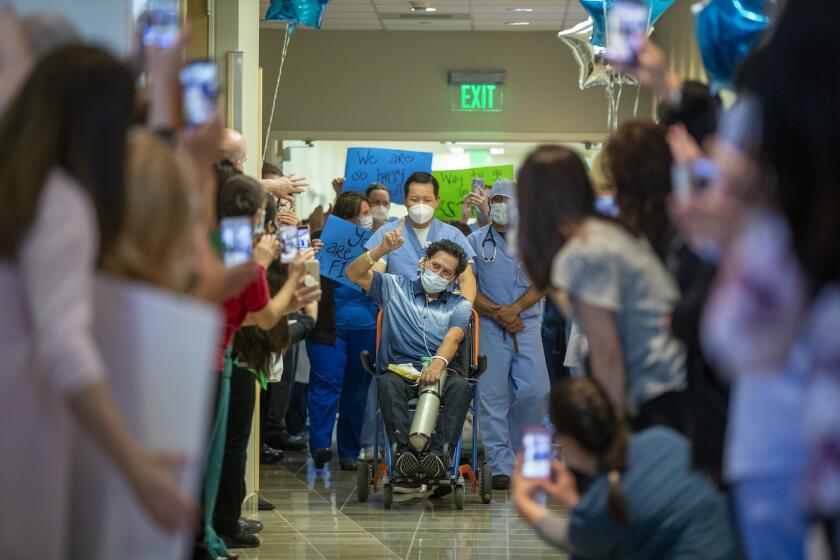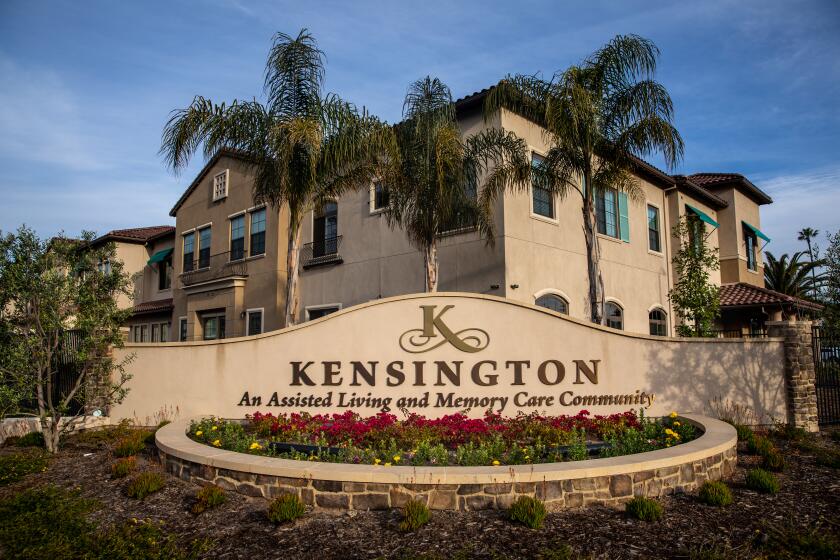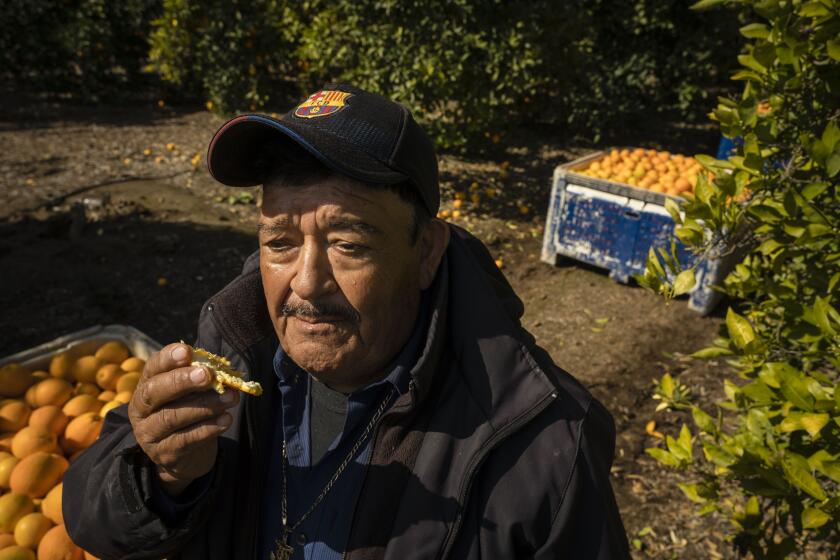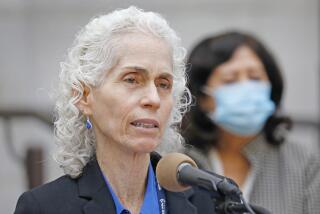Rural California hoped to be shielded from coronavirus. Now Tulare County has an outbreak
- Share via
As he drove home from the grocery store Sunday, Rubén Macareno, a city councilman in Farmersville, Calif., noticed a few groups of people socializing in their frontyards.
Macareno, while staying in his car, encouraged the groups to disperse, emphasizing the danger of the spreading coronavirus in California. Farmersville is in Tulare County, which had just reported its first coronavirus-related death.
“As the numbers start to climb, they start to say, ‘Oh shoot, this is in our backyard,’” said Macareno, who serves in the town of about 10,700 east of Visalia. He described a mentality in which many locals view the pandemic as a public health emergency that strikes cities and urban areas, not their small, more isolated enclaves.
“A lot of us don’t think it will hit us, but it can hit us,” Macareno said.
Tulare County residents, however, are seeing firsthand how the virus is infiltrating their towns along the foothills of Sequoia National Park as the number of cases and reported deaths have increased in the last week.
An outbreak in a Visalia nursing home has become a hot spot, and local leaders are working to keep residents at home, worried that some think their geography will keep them shielded from COVID-19.
These are some of the unusual new scenes across the Southland during the coronavirus outbreak.
Nestled in the San Joaquin Valley, the 460,000-resident county is home to a largely agricultural community. In 2018, the county valued its dairy production at $1.68 billion, and grapes and oranges were more than $800 million each.
In the city of Tulare, bisected by Route 99, there was “very little question that COVID-19 was going to come,” especially with the number of travelers who pass through, Deputy City Manager Josh McDonnell said.
But deeper inland, Joe Tanner, who was recently named city manager of Lindsay, a town of about 13,400 residents, is facing resistance from retail shops refusing to shut down.
The town took immediate and obvious measures to take the governor’s March emergency declaration seriously from the start, Tanner said. Officials established social distancing measures at government facilities, closed the police department lobby and installed plastic shields at the finance department, where residents pay utility bills.
Still, they’ve struggled to get a few nonessential stores to close, despite calls from the county and efforts from the city to educate them on the importance of restricting contact with others, he said. The City Council is planning to vote on an emergency ordinance to fine the stores and could also force closure, he said.
Because of Lindsay’s rural lifestyle and its location away from major highways, he said, some may think it’s safe. “There is still an element of the community that we still need to educate,” he said.
The first major COVID-19 outbreak in Tulare County was announced on April 1 at a Visalia skilled nursing facility, three days after staff members began showing symptoms.
The Redwood Springs Healthcare Center announced two healthcare staff members and six patients had tested positive. Immediately, the center distributed N95 face masks, gloves and gowns to staff and established a lockdown area to keep infected patients isolated as it tried to contain the spread, said Anita Hubbard, the administrator of the nursing home.
But it was too late. On Tuesday, six days later, 47 residents and staff members had been infected in the facility where about 60% of residents are older than 65, Hubbard said. Twelve others have tested negative, she said, and 18 tests are pending.
One resident died Tuesday morning and one remains hospitalized, Hubbard said. She said the center does not know how the spread began.
“This incident underscores the service and sacrifices made by our dedicated team every day,” she said in a statement. “Our top priority remains the health and well-being of everyone in our facility.”
As officials race to contain the pandemic, the spread in nursing homes has been particularly alarming. In Washington state, federal officials said more than 120 cases and at least five deaths were tied to one home; in California this week, one Riverside County facility had more 30 people test positive. The elderly are among the most vulnerable to the illness.
Coronavirus outbreaks are occurring in nursing homes at terrifying speed. The elderly are among the most vulnerable to the deadly new pathogen.
The cases of COVID-19 at the Visalia nursing home represent about half of the city’s 98 reported cases. Tulare County reported 168 confirmed cases on Wednesday, many of which have been traced to person-to-person contact. Tulare County health officials reported the first couple of confirmed cases in mid-March and the first coronavirus-related death on March 28. Ten days later, the death toll rose to seven.
The county reported on Tuesday the death of an individual older than 65, but how this person became sick is unknown.
The county did not say where the person lived and has released little information about the region’s coronavirus-related deaths, because ages or locations could be identifying factors in smaller towns, said Tammie Weyker-Adkins, a spokeswoman for the Tulare County Health and Human Services Agency. Of the people who have died, four were older than 65. One contracted the illness through person-to-person contact and two were travel-related.
The county has tested 1,073 people as of Wednesday through its public health lab, Weyker-Adkins said. There are nine recovered cases, and 271 people are under self-quarantine. People older than 65 account for 55 cases, the largest age group.
California’s 420,000 farmworkers are working through the crisis. But language barriers and a lack of communication on the coronavirus put many at risk.
Although the Redwood Springs center reported 47 in-house cases, Weyker-Adkins said, a total of 56 cases are tied to the nursing home, including friends and relatives of residents.
The county sent a clinical nurse to Redwood Springs to assist staff, she said, and is overseeing that the facility is keeping COVID-19 patients separated from healthy patients and providing personal protective equipment where needed.
“At this point, we are partnering with them to ensure that they are following those protocols,” she said.
Visalia City Manager Randy Groom said it was curious how the county was reporting more cases and fatalities than neighboring Fresno County, which has nearly 1 million residents but fewer reported cases and fatalities. Most counties in the San Joaquin Valley are similar in their makeup and economy, he said, but with varying testing capabilities, it was difficult to pinpoint the reason for the difference. He considered the outbreak at the nursing center a contributing factor.
These are some of the unusual new scenes across the Southland during the coronavirus outbreak.
Yet this rural city is preparing. It is working closely with a local hospital to prep spaces for infected patients, has established a testing site downtown and reserved a convention center two blocks from the hospital for possible overflow, Groom said.
Meanwhile, Macareno in Farmersville has taken to Facebook. He links articles to recent news, posts the county’s daily update of cases and takes messages from residents about concerns, coronavirus-related and not.
He said he gets the occasional message from someone saying the pandemic is a conspiracy driven by media and politics, but those have lessened as the virus begins to spread in the region. In those instances, he reminds the commenters that no matter what they believe, the illness is not political and they have to be careful around other people.
In Woodlake, a town where the clear skies offer a stunning view of the Sierra mountain range, Mayor Rudy Mendoza also heard similar messages early on from Central Valley residents. But as the pandemic creeps closer, they have stopped.
He said he has taken a practical approach to inform residents about how the pandemic will affect their daily life, and he urges residents not to pay too much attention to the influx of news from around the world and the mounting death toll in cities like New York.
“Now that we’re a month into this thing, I think people are much more wiser,” Mendoza said, “because we’re starting to see the fatalities and all the things that are going on and hitting even closer to home.”
More to Read
Sign up for Essential California
The most important California stories and recommendations in your inbox every morning.
You may occasionally receive promotional content from the Los Angeles Times.














